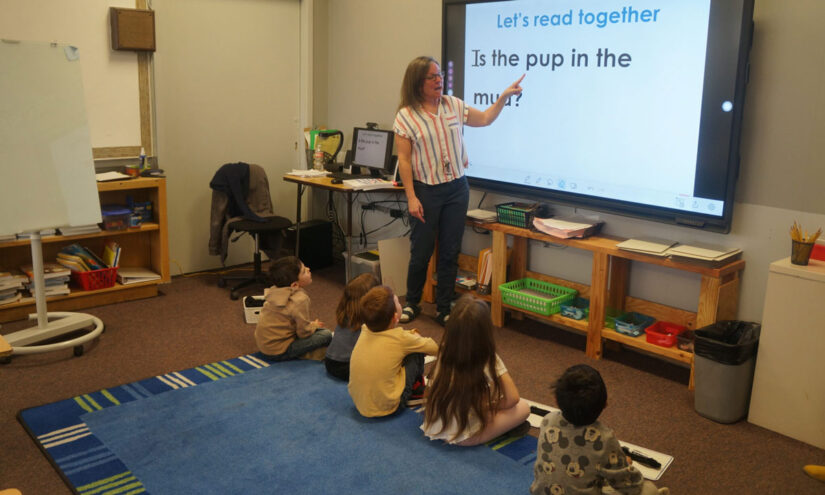Reflecting on the tenets that shape our educational practices is fundamental for …
Oregon Puts Forward New Literacy Requirements for Teacher Training and Licensing
Emma Wordsmith

Oregon’s teacher colleges and aspiring and current teachers seeking positions in public elementary schools in the state may soon face a more rigorous requirement to showcase their proficiency in reading and writing skills compared to the existing standards.
Recently, Governor Tina Kotek’s Early Literacy Educator Preparation Council, comprising representatives from K-12 institutions, Oregon teacher colleges, literacy experts, indigenous language specialists, and bipartisan lawmakers, unveiled its final recommendations for revamping literacy training for elementary educators in Oregon.
Despite efforts nationwide, the reading proficiency of U.S. children has stagnated over the years, partly due to ineffective reading methodologies. Alarmingly, around 40% of fourth-grade and one-third of eighth-grade students in Oregon scored “below basic” on the 2022 National Assessment of Educational Progress, indicating significant challenges in reading comprehension.
As part of the proposed changes, the council suggests that the Teacher Standards and Practices Commission, responsible for licensing educators in Oregon, should adopt a more comprehensive literacy standards framework. Additionally, the council emphasizes the importance of ensuring strict adherence to the new standards during the approval of literacy programs at Oregon’s 15 teacher colleges, which occurs every seven years, and throughout the teacher licensing process. If approved, these modifications could be implemented by fall 2026.
Governor Kotek commended the recommendations as a significant step forward and highlighted the need for proper evaluation and approval by the Teacher Standards and Practices Commission before implementation.
Enhancing Educational Standards
The proposed standards would mandate that teacher education programs at colleges align their curriculum with the latest cognitive and neuroscience research on reading processes. This includes equipping future elementary school educators with in-depth knowledge of language rules, foundational reading elements like phonics, effective reading instructional techniques, and strategies tailored for students with Dyslexia.
Approximately 60% of children face similar reading difficulties encountered by those with dyslexia, necessitating robust early-grade instruction in phonics and decoding skills. By incorporating dyslexia instructional standards into general literacy criteria, the recommendations aim to better prepare educators for diverse learning needs.
In a legislative initiative back in 2017, Oregon introduced Senate Bill 1003 to enhance dyslexia education within teacher training and K-12 schools. Building upon this, the council’s proposals advocate for integrating dyslexia-specific reading standards into broader literacy frameworks, promoting a more inclusive and structured approach to literacy instruction.
Ronda Fritz, council co-chair and associate professor at Eastern Oregon University, emphasized the potential positive impact of these standards on student outcomes and teacher quality, foreseeing improved literacy outcomes with well-equipped educators.
Advancing Literacy Initiatives
Historically, Oregon’s teacher preparation programs have received low ratings for reading instruction from the National Council on Teacher Quality. Addressing this gap, Governor Kotek established the Early Literacy Educator Preparation Council in 2023 under the broader Early Literacy Success Initiative, involving a $120 million investment to enhance reading skills among both educators and students in Oregon.
As part of this initiative, state educational authorities disbursed $90 million in grants to over 250 schools to bolster their literacy programs, recruit additional teaching staff and experts, and integrate science-based reading materials into the curriculum.
The recommended standards would apply to educators teaching kindergarten through fifth grade, those pursuing elementary and special education degrees, individuals seeking reading interventionist endorsements, ESL instructors, and aspiring administrative personnel, aiming to uplift literacy standards across various educational domains.
To facilitate the implementation of these standards, the council proposes offering grants to support colleges in adopting new practices, engaging state literacy experts to assist in curriculum enhancements, and guiding colleges through the transition process, ensuring alignment with the updated literacy criteria.
As educational institutions gear up for significant transformations to meet the revised standards, the council underscores the critical need for comprehensive reforms to advance literacy teaching practices in Oregon.



